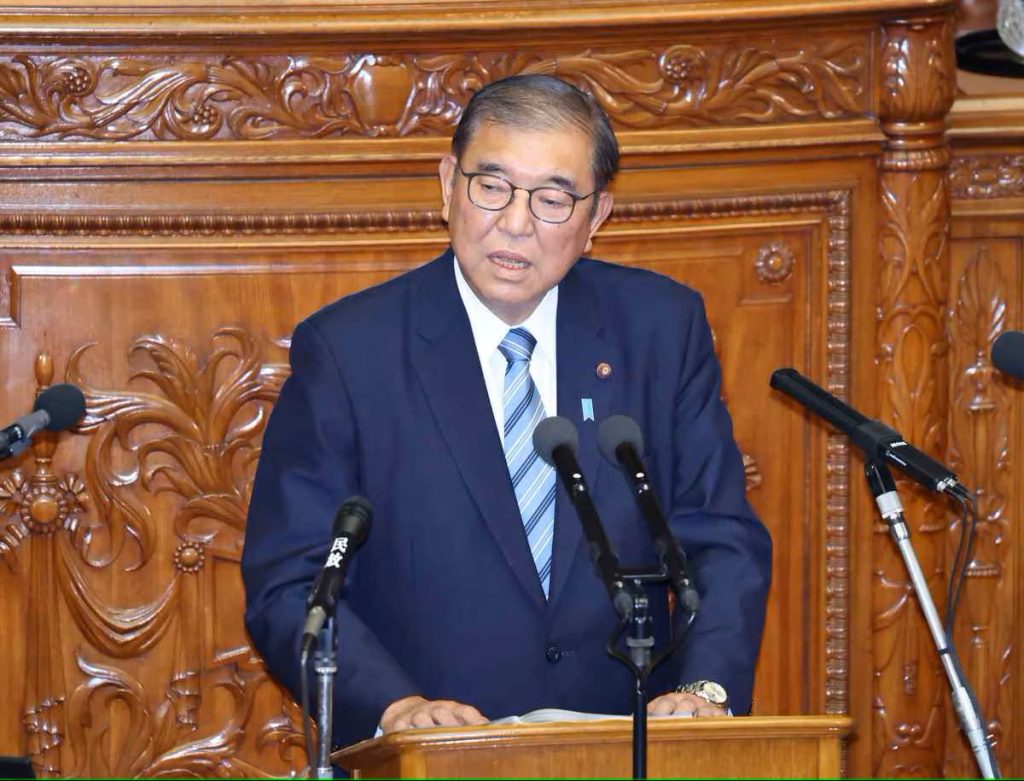
Prime Minister Shigeru Ishiba delivers a policy speech at the Lower House plenary session on November 29.
このページを 日本語 で読む
Prime Minister Shigeru Ishiba's recent policy speech characterized his administration's basic policy as one in line with public sentiment. Speaking at an extraordinary Diet session on November 29, he said: "Having heard the voice of the people, we will listen carefully to the opinions of other parties and work sincerely and humbly to reach a broad consensus."
The Prime Minister also announced that his administration would raise the tax-free income ceiling. This was in line with calls from the Democratic Party for the People to eliminate the "1.03 million JPY ($6,850 USD) annual income barrier." Having fallen into a minority, the ruling coalition must cooperate with the scheme.
Nevertheless, Ishiba's compromises portend difficulties on the road ahead.
Ishiba's China Illusion
Along with domestic politics, foreign policy and security are also important. The Prime Minister's perception of China therefore was startling.
It was difficult to understand why Ishiba again engaged in self-praise. He incredulously declared that he had engaged in "constructive discussions" with Chinese President Xi Jinping during their recent brief meeting. The Prime Minister said that he had "frankly raised" concerns about the Chinese military's increased aggression and the murder of a Japanese schoolchild in Shenzhen.
But he received virtually no response to his efforts.

China's Self-Serving Visa Diversion
China recently announced that it would resume short-term visa exemptions for Japanese nationals from November 30. The Prime Minister boasted, "I pointed this out."
But has he forgotten that China is a country that unjustly detains Japanese nationals within its borders? And recently it has seen a series of indiscriminate murderous attacks. The visa concession is hardly something to become jubilant about.
"We will assert what we should assert, and cooperate in areas where we can cooperate. That is a realistic diplomacy based on national interests," asserted PM Ishiba.
However, anybody can make statements like that. There were no specifics. Moreover, why doesn't he believe it is in the national interest to affect beneficial change in China's behavior?
Engaging with President-elect Trump
Given concerns about a Taiwan contingency, Japan needs to enhance deterrence against China and strengthen defense capabilities. Reaffirming the Japan-US alliance is also absolutely imperative. To that end, it is important that Prime Minister Ishiba meet with US President-elect Donald Trump.
However, Ishiba has declined to meet with Trump before his inauguration. He says that doing so would create difficulties. Nevertheless, Trump has met with other world leaders, including Argentine President Javier Milei.
Ishiba should continue to seek an early meeting with the President-elect.

Crucial Issues Not on Ishiba's Agenda?
Regarding the issue of abductions by North Korea, the Prime Minister did not call for a meeting with Supreme Leader Kim Jong Un. Former prime ministers Shinzo Abe, Yoshihide Suga, and Fumio Kishida all expressed their determination to face off against Kim in their parliamentary speeches. Prime Minister Ishiba's failure to seek talks may have sent the wrong message to North Korea.
As for constitutional reform, former Prime Minister Kishida specifically mentioned "finalizing the draft articles" in his Diet speech.
However, Prime Minister Ishiba has not even touched on the issue of codification in his two policy speeches to date. (One was in October and the other on November 29.) The Prime Minister must address the nation directly with a serious appeal about the need to amend the Constitution.
RELATED:
- China Resumes Visa Exemptions But Good Reason to Remain Wary
- EDITORIAL | Were Ishiba and Xi Really 'On the Same Page?'
- More Strife with China as Japanese Businessman Arrested for Espionage
Author: Editorial Board, The Sankei Shimbun
このページを 日本語 で読む








